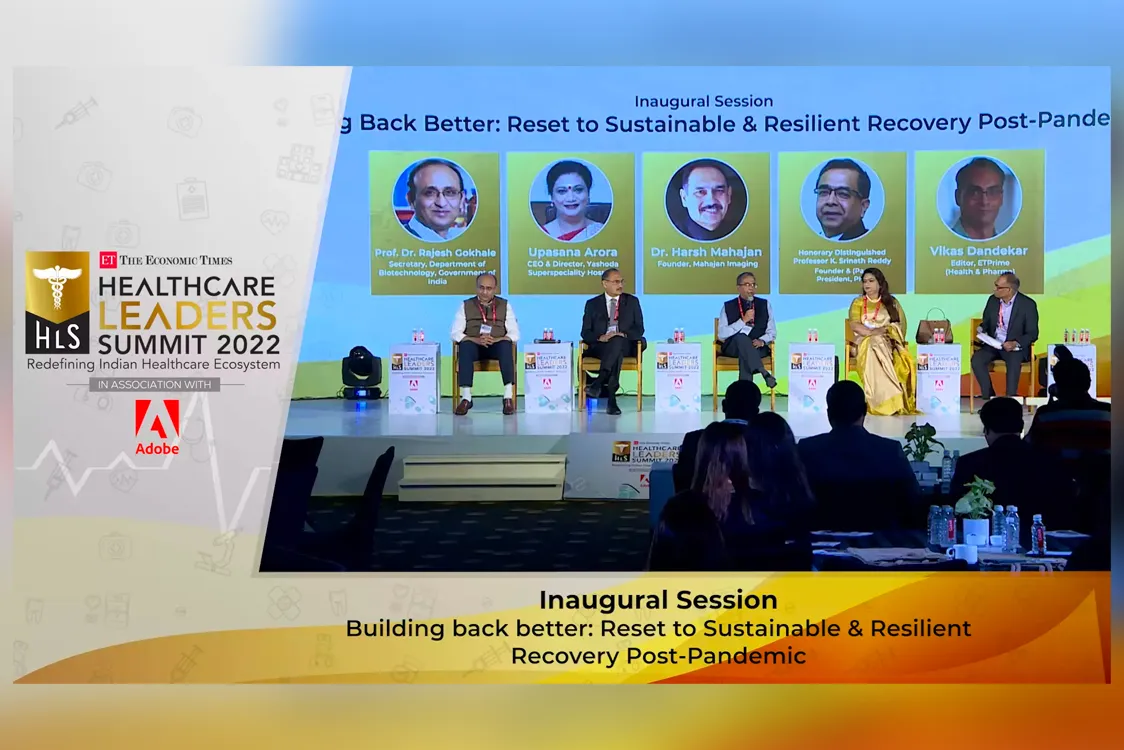New Delhi: The COVID-19 pandemic caught everyone off guard, and healthcare systems worldwide were unprepared to handle this challenge while managing daily healthcare operations.
Vikas Dandekar, Editor of ET Prime, moderated the inaugural session on “Building back better: Reset to sustainable and resilient recovery post-pandemic,” which featured experts (Health and Pharma). Prof. Dr. Rajesh Gokhale, Secretary, Department of Biotechnology, Ministry of Science and Technology, Government of India; Dr. Harsh Mahajan, Founder, Mahajan Imaging; Prof. K Srinath Reddy, President, PHFI, and Upasana Arora, CEO & Director, Yashoda Super Specialty Hospitals were the panelists for the discussion.
Dandekar asked Dr. Reddy about his observations on how the healthcare sector ran over the previous two years to get the conversation going. Although we were aware of the threat posed by zoonotic pandemics, Dr. Reddy retorted, “the systems were not fully prepared either to prevent or to detect and control rapidly.” India’s experience is not exceptional in that the healthcare system encountered difficulties. Every health system in the world felt challenged, practically.
Dr. Reddy noted that the healthcare industry had taken a proactive stance, adding, “However, it is a response recognition of the fault lines in the health system as well as the supportive social systems that have helped us to adopt several corrective measures, and we have seen that happening in terms of very strong emphasis on strengthening health infrastructure, strengthening digital health, and increasing investment in better surveillance systems.”
The panelists all agreed on the necessity of affordable healthcare, which resulted in a decline in service quality. The increased burden to close this gap causes funds needed for technological advancements to be diverted, further dampening quality and affordable care.
Speaking about the issue of hospitals overcharging during the COVID-induced lockdown, Arora pushed for the availability of high-quality, reasonably-priced healthcare services so that hospitals could continue to make money. Hospitals must invest in keeping their quality. However, because a hospital is where we deal with human lives, hospitals should operate on something other than a business model. A balance between cost-effectiveness, high-quality care, and profit is necessary, according to Arora.
Dr. Mahajan continued, “Today, India still provides quality healthcare at the lowest price in the world, and I don’t compare it to the West. I applaud India’s healthcare system for its attempt to lower the cost of quality healthcare services.” Compared to Bangladesh, Nepal, Sri Lanka, and Pakistan, we are 20–25 percent less expensive.
Dr. Mahajan stated the following when asked about the pandemic’s effect on healthcare advancements: “Digitization, telehealth, telemedicine, and home health are all areas in which the pandemic has allowed us to advance more quickly, reducing the time (needed for advancements) by five to seven years.”
To lower medical expenses, he also emphasized the significance of advancing the diagnostics sector, as effective diagnosis may be able to eliminate the need for unnecessary or experimental treatments through targeted diagnostics. “The pandemic has made preventive, predictive, and therapeutic medicine and practices more prominent. Therefore, the idea of wellness is becoming more popular, said Dr. Mahajan.
During the conversation, Dandekar emphasized the importance of biotechnology and urged Prof. Dr. Gokhale to address the significant reforms the Indian healthcare system needs to implement.
Prof. Dr. Gokhale provided insight into the individualized and targeted nature of healthcare and how crucial it is for the industry to comprehend the subjective nature of fitness and health. “Health technology is very nebulous. Athletes may only be considered healthy if they can run five kilometers. Can we define someone as healthy if they are at risk for Huntington’s disease but are currently healthy? Therefore, the government must examine health from a variety of angles. Healthcare is Pandora’s box for the government, focusing on numerous contextual issues that only technology can help with. The Department of Biotechnology’s job is to take advantage of this and ensure that India plays a significant role in the 21st century’s foundational technologies.
All panelists gave their final remarks to wrap up the discussion. According to Dr. Gokhale, the healthcare system in India needs to switch from a reactive to a proactive mode. Dr. Mahajan recommended that people adopt digitization and create digital systems specifically made to serve the needs of the Indian masses. Arora emphasized the value of self-care and regular preventive health exams. Dr. Reddy urged continued innovation across various healthcare fields but cautioned that it must be affordable and accessible to everyone as part of Universal Healthcare.





